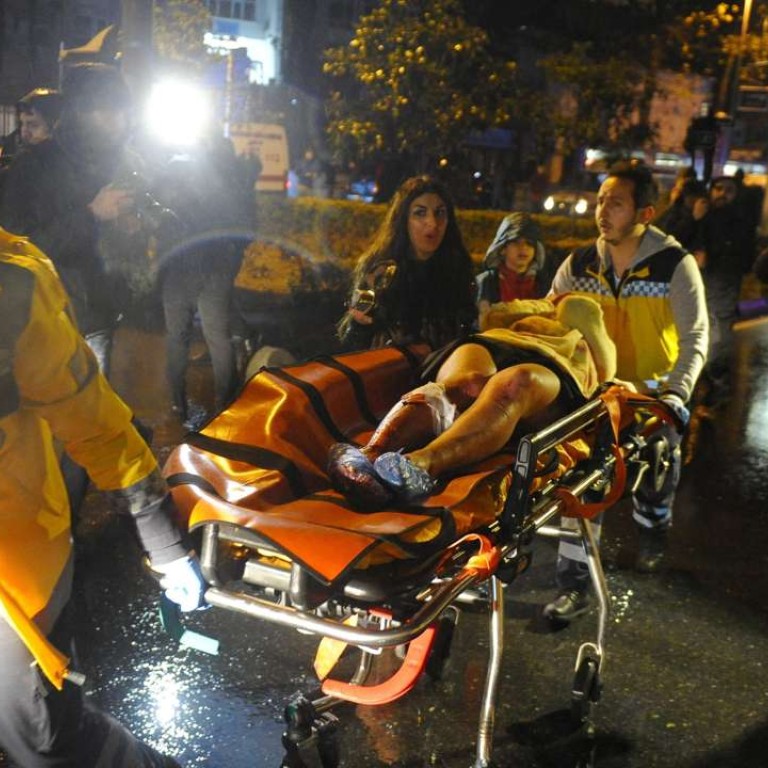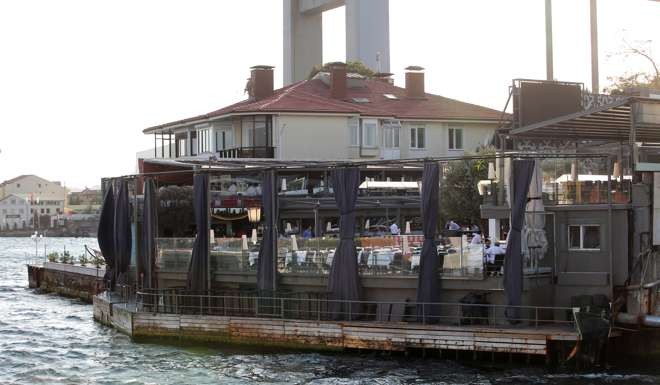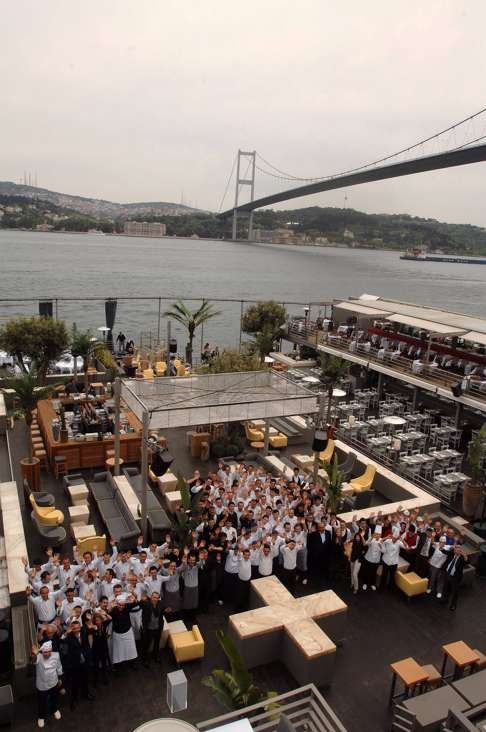
Gunman dressed as Santa escapes after killing 39 in Istanbul nightclub ‘terror attack’
The attacker may have blended in among the many undercover police officers in Istanbul who themselves were dressed as Santa Claus
Thirty-nine people were killed when a gunman reportedly dressed as Santa Claus stormed an Istanbul nightclub as revellers were celebrating New Year, the latest carnage to rock Turkey after a bloody 2016.
The assailant shot dead a policeman and a civilian at the entrance to the Reina club, one of the city’s most exclusive nightspots, and then went on a shooting rampage inside, Istanbul governor Vasip Sahin said, describing it as a “terror” attack.
“The attacker - in the most brutal and merciless way - targeted innocent people who had only come here to celebrate the New Year and have fun,” he said.
At least 16 foreigners were among the 39 people killed, Turkish Interior Minister Suleyman Soylu added.
Indicating that the attacker was still at large, Soylu said: “The search for the terrorist continues... I hope (the assailant) will be captured quickly, God willing.”
Watch: footage of gunman dressed as Santa
Many threw themselves into the water in panic and efforts were under way to rescue them, NTV television said.
Dogan news agency said there were two gunmen dressed in Santa Claus outfits, although this has yet to be confirmed.
Television pictures showed party-goers - including men in suits and women in cocktail dresses -emerging from the nightclub in a state of shock.
Sahin said the attack began at 1:15 am Sunday (6:15 am Hong Kong time), just after hundreds of Turkish and foreign revellers had seen in the New Year at the club in the Ortakoy district on the European side of the city.
“What happened today is a terror attack,” he said, without attributing blame or disclosing the fate of the attacker.
Dogan reported that some witnesses claimed the assailants were “speaking Arabic” while NTV said special force police officers were still searching the club.
İşte ilk götüntüler. 40 civarı yaralı olduğu belirtiliyor. pic.twitter.com/FExbV7e7Qy— Murat Şahin (@SunucuSpiker) December 31, 2016
The attack evoked memories of the November 2015 carnage in Paris when Islamic State jihadists went on a gun and bombing rampage on nightspots in the French capital, killing 130 people including 90 at the Bataclan concert hall.
From Sydney to Paris, Rio to London, security had been boosted over fears that the New Year festivities could present a target for violent extremists.
In Istanbul, at least 17,000 police officers were deployed and some, as is customary in Turkey, dressed themselves as Santa Claus as cover, according to television reports.
“They say 35 to 40 died but it’s probably more because when I was walking, people were walking on top of people.”
Dogan said there were at least 700 revellers at the club. It is one of Istanbul’s most elite spots, and getting past the bouncers who seek out only the best dressed is notoriously hard.

Turkey has been hit by a wave of attacks in recent months blamed on Kurdish militants and IS jihadists.
On December 10, 44 people were killed in a double bombing in Istanbul after a football match hosted by top side Besiktas, an attack claimed by the Kurdistan Freedom Falcons (TAK) seen as a radical offshoot of the PKK.
In June, 47 people were killed in a triple suicide bombing and gun attack at Istanbul’s Ataturk airport, with authorities blaming IS.
And in one of the most brazen strikes, an off-duty policeman assassinated Russia’s ambassador to Turkey in an Ankara art gallery less than two weeks ago.
“No terror attack will destroy our unity, or eradicate our fraternity or weaken Turkey’s effective fight against terror,” Justice Minister Bekir Bozdag wrote on Twitter.
Mainly Muslin Turkey’s religious affairs agency Diyanet condemned the attack, saying the fact it took place in a nightclub “was no different to it being in a market or place of worship”.


The spike in violence has capped a bloody 2016 in Turkey which saw more attacks than any other year in the history of the country.
“Tragic start to 2017 in Istanbul,” Nato Secretary General Jens Stoltenberg wrote on Twitter.
The White House condemned the “savagery” of the attack, with National Security Council spokesman Ned Price saying that Washington reaffirmed its support for its Nato ally “in our shared determination to confront and defeat all forms of terrorism”.
The US embassy warned citizens that extremist groups are continuing “aggressive efforts to conduct attacks in areas where US citizens and expatriates reside or frequent.”
Turkish President Recep Tayyip Erdogan, who is in Istanbul for the New Year, had been informed of the attack, local media said.
The shooting spree came as the Turkish army wages a four-month incursion in Syria to oust IS jihadists and Kurdish militants from the border area, suffering increasing casualties.
As is customary after such attacks in Turkey, the authorities slapped a broadcast ban on images from the incident.
2016: a year of deadly attacks in Turkey

December 17: 14 soldiers are killed and dozens of other people wounded in a suicide attack targeting a military bus in the central city of Kayseri. The Kurdistan Freedom Falcons (TAK), seen as a radical offshoot of the outlawed Kurdistan Workers’ Party (PKK), claim responsibility.
December 10: Forty-four people are killed, mainly police officers, and 166 wounded when twin bombings struck Istanbul after a home football match hosted by top side Besiktas. TAK claims it was behind the attacks.
November 24: A car bombing in the southern city of Adana kills two people and injures 33.
November 4: Nine people, including two policemen, are killed in a car bombing at a police station in Diyarbakir, the main city in Turkey’s Kurdish majority southeast. It is claimed by Islamic State and then TAK.
October 9: Eighteen people are killed when a van explodes near a police post in the southeastern district of Semdinli, a bombing blamed on the PKK.
August 26: 11 police officers are killed in a suicide car bombing in Cizre, a mainly Kurdish southeastern town on the Syrian border, which was claimed by the PKK.

August 20: 57 people, 34 of them children, die in an IS-linked bomb attack on a Kurdish wedding in the Turkish city of Gaziantep near the Syrian border. President Recep Tayyip Erdogan blames the IS group.
June 28: 47 people are killed, including foreigners, and over 200 injured in a triple suicide bombing and gun attack at Istanbul’s Ataturk airport. There is no claim of responsibility but authorities say evidence points to IS.
June 7: At least seven police officers and four civilians die when a bomb rips through a police vehicle near the historic centre of Istanbul. The TAK claims the attack and warns tourists to stay away.
March 19: Three Israelis and an Iranian are killed and dozens injured in a suicide bombing targeting Istanbul shopping thoroughfare Istiklal Caddesi. The authorities blame IS.
March 13: 34 people are killed and dozens wounded in a suicide car bomb attack in Ankara. TAK claims the assault.
February 17: At least 28 people are killed and about 80 hurt in a suicide bombing targeting the Turkish military in Ankara. The attack is also claimed by TAK.
January 12: Twelve German tourists are killed and more than a dozen others wounded in a suicide attack by a Syrian bomber in Istanbul’s Sultanahmet district, the ancient tourist heart of the city and home of the Blue Mosque. The prime minister said the bomber belonged to IS.

.png?itok=arIb17P0)